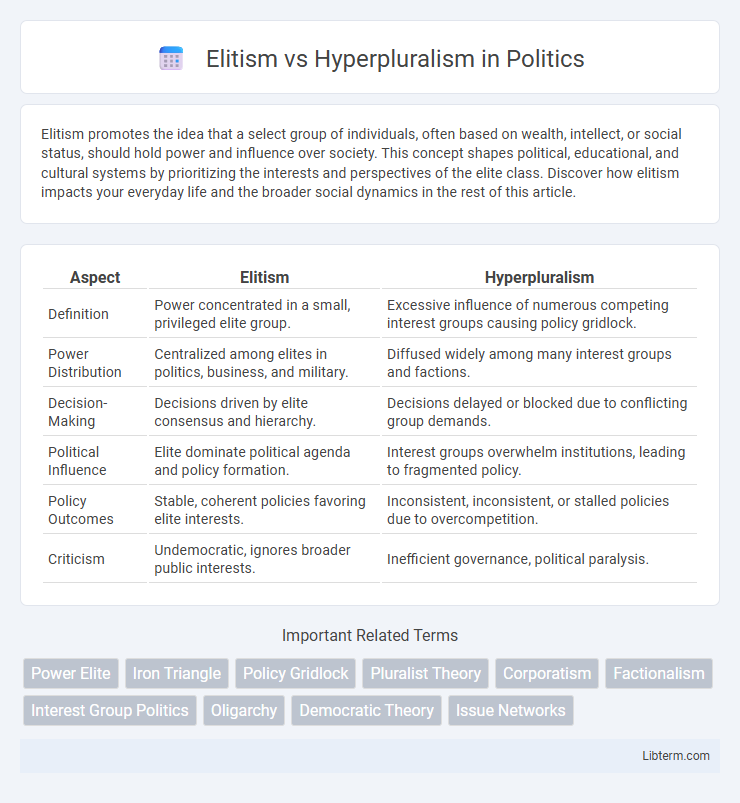Elitism promotes the idea that a select group of individuals, often based on wealth, intellect, or social status, should hold power and influence over society. This concept shapes political, educational, and cultural systems by prioritizing the interests and perspectives of the elite class. Discover how elitism impacts your everyday life and the broader social dynamics in the rest of this article.
Table of Comparison
| Aspect | Elitism | Hyperpluralism |
|---|---|---|
| Definition | Power concentrated in a small, privileged elite group. | Excessive influence of numerous competing interest groups causing policy gridlock. |
| Power Distribution | Centralized among elites in politics, business, and military. | Diffused widely among many interest groups and factions. |
| Decision-Making | Decisions driven by elite consensus and hierarchy. | Decisions delayed or blocked due to conflicting group demands. |
| Political Influence | Elite dominate political agenda and policy formation. | Interest groups overwhelm institutions, leading to fragmented policy. |
| Policy Outcomes | Stable, coherent policies favoring elite interests. | Inconsistent, inconsistent, or stalled policies due to overcompetition. |
| Criticism | Undemocratic, ignores broader public interests. | Inefficient governance, political paralysis. |
Understanding Elitism: Definition and Key Features
Elitism is a political theory asserting that a small group of powerful individuals or elites hold the majority of influence and control over government decisions, often prioritizing their own interests over the public good. Key features of elitism include a hierarchical structure where elites possess superior resources, expertise, and networks, enabling them to dominate policy-making processes. This concentration of power limits broad participation and usually results in policies that reinforce existing social and economic inequalities.
Hyperpluralism Explained: Origins and Characteristics
Hyperpluralism originates from the belief that excessive group influence weakens government effectiveness by creating policy gridlock and contradictory regulations. It is characterized by numerous interest groups competing for control, leading to fragmented policymaking and the dilution of political power. This phenomenon results in a government overwhelmed by competing demands, making decisive governance difficult and reducing the capacity for coherent public policy.
Historical Context: The Rise of Competing Theories
Elitism emerged in the early 20th century as political theorists like Vilfredo Pareto emphasized the dominance of a small, cohesive elite controlling power in society. Hyperpluralism gained traction in the late 20th century, highlighting the challenges posed by numerous competing interest groups causing governmental gridlock. Both theories evolved as responses to changing political dynamics, with elitism critiquing mass democracy and hyperpluralism examining the influence of fragmented group interests.
Core Differences Between Elitism and Hyperpluralism
Elitism centers on power being concentrated in the hands of a small, privileged group that makes key decisions, whereas hyperpluralism suggests that too many competing interest groups create policy gridlock and inefficiency. In elitism, a unified elite shapes policy outcomes decisively, while hyperpluralism results in fragmented authority, making it difficult to achieve consensus or effective governance. The core difference lies in elitism's focus on concentrated power versus hyperpluralism's emphasis on excessive group competition undermining coherent policy-making.
Impact on Democratic Processes
Elitism centralizes power in the hands of a few influential groups, often leading to policy decisions that reflect the interests of the wealthy and powerful rather than the broader population, thereby limiting democratic participation and accountability. Hyperpluralism, characterized by the proliferation of competing interest groups, can result in policy gridlock and inefficiency, as conflicting demands overwhelm legislative processes and hinder effective governance. Both frameworks influence democratic processes by shaping how power is distributed and how responsive government institutions are to public needs and demands.
Influence on Policy Making and Governance
Elitism concentrates power in the hands of a few influential groups or individuals who dominate policy making through established networks and resources, leading to governance that reflects elite interests. Hyperpluralism, by contrast, involves numerous competing groups that create fragmented influence, often resulting in policy gridlock and inefficiency as conflicting demands overwhelm decision-makers. This dynamic challenges effective governance by diluting consensus and complicating coherent policy formulation.
Criticisms of Elitism: Concentration of Power
Elitism faces criticism for concentrating power in the hands of a small, privileged group, which often undermines democratic principles by limiting broader participation in decision-making processes. This concentration of power can lead to policy outcomes that favor elite interests over those of the general public, exacerbating social inequalities. Critics argue that elitism reduces political transparency and accountability, creating barriers for marginalized voices to influence government actions.
Drawbacks of Hyperpluralism: Policy Gridlock and Fragmentation
Hyperpluralism often results in policy gridlock as competing interest groups exert excessive influence, preventing cohesive decision-making and delaying legislative action. This fragmentation dilutes governmental authority and weakens the implementation of effective policies, leading to inefficient governance. The proliferation of diverse demands overwhelms policymakers, hindering the ability to address critical national issues comprehensively.
Real-World Examples: Elitism vs Hyperpluralism in Practice
Elitism is evident in the policies shaped by influential think tanks like the Heritage Foundation, where elite interests guide national agendas. Hyperpluralism is showcased in Capitol Hill gridlock, where diverse and competing interest groups stall legislative progress, reflecting factionalism. Both models illustrate how power distribution impacts governance effectiveness in democratic systems.
The Future of Power Distribution in Modern Societies
Elitism posits that power remains concentrated in the hands of a small, cohesive group of influential individuals, shaping policies and societal outcomes with limited public input. Hyperpluralism suggests power diffuses among numerous competing interest groups, often leading to fragmented governance and policy gridlock. The future of power distribution in modern societies may involve a nuanced blend of these theories, where elite influence persists but is continuously challenged by increasingly organized and diversified interest group activity.
Elitism Infographic

 libterm.com
libterm.com